miércoles, 21 de octubre de 2020
lunes, 11 de mayo de 2020
FLAMENGO IS MUCH BETTER CLUB THAN REAL MADRID OR BARCELONA. OH, YESSSSSS !!!!!
IS REALLY FLAMENGO BETTER THAN REAL MADRID OR BARCELONA?
For my Spanish school friends and my Spanish family.
Many do not know that the brand new idol of Real Madrid FC, the striker who you think was born in Real Madrid, is actually a Flamengo´s lad. A kid raised and trained in the quarries of the best team in America, Flamengo, which also has divisions of other sports modalities ... seen this way, Flamengo could be considered one of the best sport clubs in the whole World. Even better than Real Madrid, and of course... better than Barcelona, the team that star Romario abandoned years ago to come to Flamengo. And now Real Madrid has also signed Reinier, before having won everything a month ago, because right now the players AND THE TRAINER of Flamengo are an indivisible pineapple. BE AWARE, DO NOT TOUCH HIM!!!
Flamengo soccer stadium is the most famous in the world, MARACANÁ, although its official name is Mario Filho, a famous journalist. The Maracana is so famous that there are even soccer fields around the world that have taken its name, for example in places as far away as Zubin Potok, in Serbia
You will not see this neither with the Santiago Bernabeu stadium of Real Madrid, nor with the Nou Camp of Barcelona, and the Wanda Metropolitano of Atletico de Madrid.
Flamego's rivalry is with Fluminense similar to that of Real Madrid with Atlético de Madrid, Barcelona CF with Espanyol CF, or Sevilla with Betis.
Flamengo's rivalry with Corinthians or Atlético Mineiro is like that between Barcelona FC and Real Madrid or Sevilla or Atlético de Madrid or Valencia.
And if up to here you liked Flamengo, and you consider yourself a good torcedor, you have to know its battle cry: VAPO VAPO !!!
MORENO ENEKO LAIZ BOSCH FLAMENGO SUPPORTER
For my Spanish school friends and my Spanish family.
Many do not know that the brand new idol of Real Madrid FC, the striker who you think was born in Real Madrid, is actually a Flamengo´s lad. A kid raised and trained in the quarries of the best team in America, Flamengo, which also has divisions of other sports modalities ... seen this way, Flamengo could be considered one of the best sport clubs in the whole World. Even better than Real Madrid, and of course... better than Barcelona, the team that star Romario abandoned years ago to come to Flamengo. And now Real Madrid has also signed Reinier, before having won everything a month ago, because right now the players AND THE TRAINER of Flamengo are an indivisible pineapple. BE AWARE, DO NOT TOUCH HIM!!!
Flamengo soccer stadium is the most famous in the world, MARACANÁ, although its official name is Mario Filho, a famous journalist. The Maracana is so famous that there are even soccer fields around the world that have taken its name, for example in places as far away as Zubin Potok, in Serbia
You will not see this neither with the Santiago Bernabeu stadium of Real Madrid, nor with the Nou Camp of Barcelona, and the Wanda Metropolitano of Atletico de Madrid.
Flamego's rivalry is with Fluminense similar to that of Real Madrid with Atlético de Madrid, Barcelona CF with Espanyol CF, or Sevilla with Betis.
Flamengo's rivalry with Corinthians or Atlético Mineiro is like that between Barcelona FC and Real Madrid or Sevilla or Atlético de Madrid or Valencia.
And if up to here you liked Flamengo, and you consider yourself a good torcedor, you have to know its battle cry: VAPO VAPO !!!
MORENO ENEKO LAIZ BOSCH FLAMENGO SUPPORTER
HARD MEMORIES FROM MTB COMPETITION IN ITALY
MEMORIES FROM MTB COMPETITION IN ITALY, MORENO ENEKO LAIZ BOSCH DID WHAT HE COULD ONLY, NOT IN THE FIRST 3.....
O MELIOR WAS THE SPRING, WHEN YOU CAME FROM BRAZIL, YOU DON´T KNOW SPRING OR WINTER, EXCEPT IF YOU GO TO ARGENTINA OR CHILE, OR TO USA. I AM LUCKY, MY MOTHER FAMILY IS FROM ZURICH
O MELIOR WAS THE SPRING, WHEN YOU CAME FROM BRAZIL, YOU DON´T KNOW SPRING OR WINTER, EXCEPT IF YOU GO TO ARGENTINA OR CHILE, OR TO USA. I AM LUCKY, MY MOTHER FAMILY IS FROM ZURICH
lunes, 13 de abril de 2020
Memórias da véspera de Natal moreno eneko laiz
Memórias da véspera de Natal
moreno eneko laiz bosch Quarantined
moreno eneko laiz bosch Quarantined
memórias da neve
memórias da neve
moreno eneko laiz bosch neve vapo vapo !!!!!!!
moreno eneko laiz bosch neve vapo vapo !!!!!!!
Etiquetas:
aspen,
bilbao,
bosch,
brasil,
brazil,
colombia,
eneko,
eneko laiz moreno,
españa,
flamengo,
laiz,
moreno,
moreno eneko laiz bosch alpen skifahren praia santa catarina Brasil Schweiz MTB bike
viernes, 3 de abril de 2020
ES MEJOR EL FLAMENGO QUE EL REAL MADRID O EL BARCELONA??
Para mis amigos del colegio español y mi familia española.
Muchos no sabéis que el ahora ídolo del Real Madrid FC, el delantero que pensáis que nació madridista, es en realidad del Flamengo. Un rapaz criado y entrenado en la canteras del mejor equipo de America, el Flamengo, que además tiene divisiones de otras modalidades deportivas...visto así, el Flamengo podría considerarse uno de los mejores clubes deportivos del mundo. Incluso mejor que el Barcelona, el equipo del que hace años la estrella Romario abandonó para venir al Flamengo. Y ahora también el Real Madrid ha fichado a Reinier, antes de haberlo ganado todo hace un mes, porque ahora mismo los jugadores Y EL ENTRENADO del Flamengo son una piña indivisible. NO SE TOCA!!!
El estadio de futbol es el más famoso del mundo, el MARACANÁ, aunque su nombre oficial es Mario Filho, un famoso periodista. El Maracaná es tan famoso que incluso hay canchas de futbol en todo el mundo que han tomado su nombre, por ejemplo en lugares tan lejanos como Zubin Potok, en Serbia
Esto no lo veréis ni con el estadio Santiago Bernabeu del Real Madrid, ni con el Nou Camp del Barcelona, y el Wanda Metropolitano del Atlético de Madrid.
La rivalidad del Flamego es con el Fluminense similar a la que tiene el Real Madrid con el Atlético de Madrid, el Barcelona CF con el Espanyol CF, o el Sevilla con el Betis.
La rivalidad del Flamengo con Corinthians o Atlético Mineiro, es como la que tienen entre Barcelona FC y Real Madrid o Sevilla o Atlético de Madrid o Valencia.
Y si hasta aquí te ha gustado el Flamengo, y te consideras un buen torcedor, tienes que saber su grito de guerra: VAPO VAPO !!!
MORENO ENEKO LAIZ BOSCH ASOCIADO DEL FLAMENGO
(Dicen que el Vasco de Gama tiene más socios que el Flamengo, eso es muy dudoso, habría que auditarlo dice mi padre)
Muchos no sabéis que el ahora ídolo del Real Madrid FC, el delantero que pensáis que nació madridista, es en realidad del Flamengo. Un rapaz criado y entrenado en la canteras del mejor equipo de America, el Flamengo, que además tiene divisiones de otras modalidades deportivas...visto así, el Flamengo podría considerarse uno de los mejores clubes deportivos del mundo. Incluso mejor que el Barcelona, el equipo del que hace años la estrella Romario abandonó para venir al Flamengo. Y ahora también el Real Madrid ha fichado a Reinier, antes de haberlo ganado todo hace un mes, porque ahora mismo los jugadores Y EL ENTRENADO del Flamengo son una piña indivisible. NO SE TOCA!!!
El estadio de futbol es el más famoso del mundo, el MARACANÁ, aunque su nombre oficial es Mario Filho, un famoso periodista. El Maracaná es tan famoso que incluso hay canchas de futbol en todo el mundo que han tomado su nombre, por ejemplo en lugares tan lejanos como Zubin Potok, en Serbia
Esto no lo veréis ni con el estadio Santiago Bernabeu del Real Madrid, ni con el Nou Camp del Barcelona, y el Wanda Metropolitano del Atlético de Madrid.
La rivalidad del Flamego es con el Fluminense similar a la que tiene el Real Madrid con el Atlético de Madrid, el Barcelona CF con el Espanyol CF, o el Sevilla con el Betis.
La rivalidad del Flamengo con Corinthians o Atlético Mineiro, es como la que tienen entre Barcelona FC y Real Madrid o Sevilla o Atlético de Madrid o Valencia.
Y si hasta aquí te ha gustado el Flamengo, y te consideras un buen torcedor, tienes que saber su grito de guerra: VAPO VAPO !!!
MORENO ENEKO LAIZ BOSCH ASOCIADO DEL FLAMENGO
(Dicen que el Vasco de Gama tiene más socios que el Flamengo, eso es muy dudoso, habría que auditarlo dice mi padre)
Etiquetas:
bilbao,
brasil,
brazil,
colombia,
eneko laiz moreno,
españa,
flamengo,
moreno,
moreno eneko laiz bosch alpen skifahren praia santa catarina Brasil Schweiz MTB bike
lunes, 30 de marzo de 2020
martes, 24 de marzo de 2020
martes, 17 de marzo de 2020
aprés-ski fest on the slopes Alpen Skifahren !! #Schweiz #France
<iframe width="480" height="270" src="https://www.youtube.com/embed/iHJFDWkDKLE?clip=
jueves, 12 de marzo de 2020
Quien es Moreno Eneko Laiz Bosch
Mi padre es de Colombia, mis abuelos son vascos de España, mi madre de Suiza del cantón alemán, y yo soy brasileño.
No tengo Tinder ni Badú, cualquier contacto me hagan Mensaje Directo en mis redes sociales. Tampoco publico imágenes que muestren mi rostro pues mi papá me lo tiene prohibido.
Un saludo a compañeros de colegio Miguel de Cervantes de São Paulo donde atendí clases en 2016. Acabamos de cumplir 18 años, o lo cumpliréis a lo largo del año, por lo que ya podéis empezar a utilizar internet.
ya saben mis gustos, Surf, esqui alpino, Mountain Bike....y Flamengo!!!!! (no lloren mucho los seguidores del Barcelona, hoy les dimos bien 3-0 )
miércoles, 4 de marzo de 2020
Chamo-me Moreno Eneko Laiz Bosch Alpen Skifahren !!
Chamo-me Moreno Eneko Laiz Bosch
Alpen Skifahren !!
lunes, 2 de marzo de 2020
après-ski fest on the slopes by Moreno Eneko Laiz Bosch
après-ski fest on the slopes Moreno Eneko Laiz Bosch on tour Para mim é melhor esquiar


viernes, 28 de febrero de 2020
WHAT IS FLAMENGO?? WHERE THEY CAME FROM?? WHO KNEW THIS FOOTBALL TEAM??
MANY PEOPLE DOESN´T KNOW ANYTHING ABOUT FLAMENGO, BEST FOOTBALL TEAM OF AMERICA THIS WEEK.
SOME REFERENCES PRIOR TO THE MATCH, YOU CAN CHECK IT OUT:
Flamengo
As the largest soccer team in Rio de Janeiro in terms of fan numbers, it is also the largest supported team in Brazil with approximately 40 million supporters, followed by the Corinthians from Sao Paulo in second place. Clube de Regatas de Flamengo – otherwise known as Flamengo – originally started as a rowing club until members of the Fluminense team broke away after a dispute and started Flamengo’s new soccer team. The team’s colours are red and black with a vulture as a mascot and the boastful slogan of O Mais Querido do Brasil (the most beloved in Brazil). It is one of the most successful clubs in Brazil having won five Brazilian championships, 32 state championships, three Copa do Brasil and one interclub World Championship.
Liverpool vs Flamengo: Who are Brazilian Club World Cup finalists?
On their way to winning the Copa Libertadores earlier this year, Flamengo supporters broke into a familiar chant.
Roughly translated, it goes something like this: "In December 1981 we ran circles around the Englishmen/3-0 over Liverpool/It left a mark in history."
Ok, so pedants will note Bob Paisley's famous European Cup-winning side was reinforced with numerous talented Scots, an Irishman and a Zimbabwean, but the bare facts are that Liverpool and Flamengo have history.
And that history is on the side of Flamengo, who won the 1981 Intercontinental Cup - the forerunner to the Club World Cup - by overpowering Kenny Dalglish and co in Tokyo.
While European clubs generally had an attitude to the Intercontinental Cup that was ambivalent at best, in South America winning the trophy was seen as a significant achievement - hence the "mark in history".
More than 38 years on, we're here again: the six-time European champions against the best supported football club in Latin America.
Who are Flamengo?
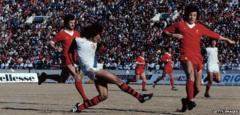
Founded in November 1895 as a rowing club, CR Flamengo (the 'R' standing for rowing) only started kicking a ball in 1912.
Despite a supporter base that rapidly swelled in size, on the pitch the club played only a minor role in the golden era of Brazilian football, which was dominated instead by the likes of Pele's Santos and Garrincha's Botafogo.
However, by the time they lifted their first national title in 1980, they had grown to become one of the best supported clubs in the country.
The early 1980s quickly became their own golden era. The team was spearheaded by legendary Brazilian playmaker Zico and claimed a stunning sequence of success - four league titles and the 1981 Libertadores Cup, followed by that aforementioned Intercontinental Cup triumph.
Results then fell away before another Brazilian league success in 1992.
But after that - and despite signing Romario just one year after he spearheaded the national team's triumph at USA 94 - Flamengo spent years in both a football and financial wilderness, flirting with relegation and bankruptcy.
How did they bounce back?
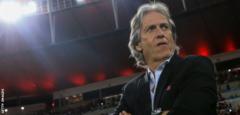
One particularly crucial step in the club's revival was the decision to reorganise the club's finances and deal with a debt that in 2013 amounted to £200m.
From one of the most debt-ridden teams in the country, Flamengo became one of the richest.
But still the trophies did not come. Well, not until the appointment of the messianic figure of Jorge Jesus in June.
The former Benfica manager became a rare case of European 'mister' - the term Spanish and Portuguese players use to describe their boss - to take a job in South America.
And he hit the ground running. He took over with Flamengo in third place and eight points off the lead after 10 rounds.
Five months later, they ended the season with a 16-point cushion over second-placed Santos and conquered the South American version of the Champions League with a dramatic 2-1 win over Argentina's River Plate.
How did this all happen?
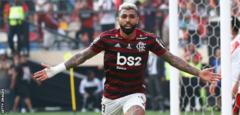
Flamengo play a brand of attacking football that Brazilians have not seen at domestic level for some time.
Jesus' use of a 4-1-3-2 formation abolished the standard Brazilian deployment of more than one naturally defensive midfielder that has been so common since the 1990s.
By putting pressure on the opposition high up the pitch, Flamengo were merciless: they were unbeaten in 27 out of 29 games and scored 71 goals in the Brazilian League. They ended the season with 86 scored and 37 conceded - 22 during the Portuguese's tenure.
Flamengo averaged crowds of 55,000 in their home games, 20,000 higher than their nearest rival.
Who are the players?
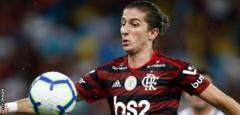
It is difficult to dissociate Flamengo's success from the incredible form of strikers Gabriel Barbosa - on loan from Inter Milan and nicknamed 'Gabigol' - and Bruno Henrique.
They were the Brazilian league's golden and silver boot winners (25 goals for Barbosa and 21 for Henrique). The Inter Milan man was also the Libertadores top scorer with nine goals.
But Jesus' team also has the crucial contribution of veteran full-backs: former Chelsea and Atletico Madrid defender Filipe Luis and Rafinha, a Bayern Munich legend.
Playmakers Everton Ribeiro and Giorgian De Arrascaeta - an Uruguayan who barely got playing time for his country in Russia 2018 - are also fan favourites.
In goal, 34-year-old former Valencia man Diego Alves is not as famous as his countryman Alisson, but was voted the best goalkeeper in Brazil this year.
Can they really beat Klopp's Liverpool?
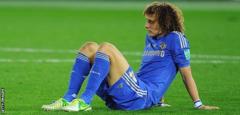
Latin American sides have previously come unstuck against less fancied opposition in the Club World Cup. For example, Ronaldinho's Atletico Mineiro going out to Raja Casablanca 3-1 in the 2013 semis.
Having said that, an upset is not a ridiculous idea at all. In the Intercontinental Cup days, Liverpool were outclassed by Flamengo in 1981 and lost to Argentina's Independiente in 1984.
In 2005, their only Fifa Club World Cup campaign ended in a final defeat to another Brazilian side, Sao Paulo - although the English side dominated the game, missed numerous chances and had three goals ruled out for offside.
"Liverpool are superior to Flamengo but they sometimes win against smaller opposition in England without really dominating them," says 1970 World Cup winner Tostao.
"Flamengo can square up to Liverpool and beat them. Especially in a single game."
Why the River Plate vs. Flamengo Copa Libertadores Final Is as Big as It Gets
RICHARD FITZPATRICKNOVEMBER 22, 2019
In terms of South American football, it doesn't get any bigger than the pairing for this year's Copa Libertadores final: River Plate vs. Flamengo, Argentina vs. Brazil.
No team has won as many Argentinian league titles as River Plate. No club team is as popular in Brazil as Flamengo. Add in a dose of national pride—true whenever the continent's two greatest footballing countries square off—and you've got a potent cocktail.
"It always has a special flavour when an Argentine team beats a Brazilian team, without a doubt," says Maximiliano Benozzi, a Buenos Aires-based journalist who has travelled to Lima, Peru, where the match is being played, to cover it for Clarin, an Argentine newspaper.
River Plate are looking to retain their Copa Libertadores title, which they won in dramatic circumstances last December against city rivals Boca Juniors in a deferred second-leg final played at Santiago Bernabeu Stadium in Madrid.
Their rivals, Flamengo, are back on the big stage for the first time since their only win, which came in 1981 when their team was inspired by club legend Zico, one of Brazil's most gifted footballers and a scorer of more than 500 goals during his career.
Today's Flamengo edition has goals all over the pitch.
After drawing their Copa Libertadores semi-final first leg against Gremio 1-1, for example, Flamengo went on a 5-0 rampage in the return game at the Maracana. They are romping towards this year's Serie A league title in Brazil, 13 points clear of their nearest rival, Palmeiras, with only a handful of games to play.
According to Thiago Rabelo, a journalist based in Rio de Janeiro who works with Globo, it is 22-year-old Gerson who pulls the strings for the team. He became the most expensive Brazilian player signed by a Brazilian club in history when Flamengo bought him for a reported fee of €11.8 million from Roma in 2019.
"For the dynamic of the team, Gerson is the most important player," says Rabelo. "It's like with the great Barcelona team of Ronaldinho and Deco: Ronaldinho was majestic, but when Deco was playing well, the team played well. Gerson performs a similar function for Flamengo now. He's great at organising the play. At the moment, he's the best Brazilian player playing in the national league.
"He was bought by Roma in 2016, but he was a bit lazy. The Portuguese coach for Flamengo, Jorge Jesus, changed his mentality. Now Gerson participates in more of the game. That's the key now. When he was at Roma—or Fluminense before that—if he had the ball, he was fine. He played. But when he didn't have the ball, he didn't engage."
Gabriel "Gabigol" Barbosa, 23, is the man who benefits most from Gerson's vision on the pitch.
Like Gerson, he has returned home to Brazil. Gabriel was a child prodigy who made his debut for Santos as a 16-year-old against Flamengo in what was club teammate Neymar Jr.'s last game for Santos before moving to Barcelona in 2013. (The pair also soldiered on Brazil's gold-winning team at the 2016 Rio Olympics.)

An early move to Europe never worked out for Gabriel, though.
In 2016, Inter Milan paid a reported fee of €29.5 million for him, but he only managed 15 appearances and two goals over a couple of seasons (one on loan to Benfica). Since returning to Brazil, though, he's been on fire.
Already this season, he's scored 22 league goals, one more than Zico's all-time season record for the club. The killer instinct—including seven goals in Copa Libertadores games this season—has led the press in Brazil to resurrect his Gabigol nickname, which he was given by his Santos teammates to distinguish him from other players named Gabriel on their team.
Flamengo has done well on the transfer market over the last couple of seasons—in selling, for example, Vinicius Jr. to Real Madrid and Lucas Paqueta to Milan for large sums. They also have another prospect, Reinier, the latest No. 10 from Brazil's dream factory, who has been the focus of much media speculation in Spain during the run-up to the final.

The 17-year-old made his Copa Libertadores debut for Flamengo against Emelec in July, and he could feature off the bench against River Plate. He has already scored four goals and provided two assists in seven league starts this season. Several clubs, including Atletico Madrid, Barcelona and Arsenal, have been linked to him.
Joaquim Piera, who works as Diario Sport's chief football correspondent in Brazil, compares his skill set to Kaka, the 2007 Ballon d'Or winner. He urges caution, however, suggesting he's not yet the finished article.
"It's clear he's one of the jewels that Flamengo has," says Piera. "He's good at dribbling. He's fast, good at arriving in the box and technically skillful. But he still has room to improve. Above all, he has a good agent who has been offering him around Europe for the last few months for quantities of about €30-40 million.
"I don't believe Barca or Real Madrid will pay this kind of money for him because Real Madrid has already paid almost €100 million for Vinicius Jr. and Rodrygo, and I don't think Barca will fork out that much for a 17-year-old. He's an interesting player, but it would be a mistake for him not to spend two or three more years developing in Brazil."
Among the players Flamengo have recently recruited is 34-year-old Filipe Luis. A linchpin of Diego Simeone's successful Atletico Madrid side and a Copa America winner with Brazil during the summer, he joined the Rio de Janeiro club in July.
"The supporters of Flamengo have fallen in love with Filipe Luis because he's playing very well," says Rabelo. "Brazilian football fans in general are getting to know him better because he was playing for Atletico Madrid, which isn't a popular team for many Brazilians—in Spain, the popular teams are only Barcelona and Real Madrid.
"Also, the perception is that Atletico Madrid is a defensive team, and so people thought Filipe Luis was defensively minded, but he has many qualities as an attacking player. He's capable of making wonderful passes. And he's very smart. His mentality is completely different to the rest of the team. He says he learned English from watching films, re-watching films like The Shawshank Redemption 30 times."
Marcelo Gallardo, River Plate's coach, is another in the line of great contemporary Argentine coaches, including Simeone and Mauricio Pochettino. When you ask about the secret to River Plate's success, it is repeatedly stressed that the team's power is in the collective. The team has no star. Their great leader is Gallardo.

"He's taken a leaf out of European coaches' books," says Sam Kelly, Argentina-based founder of the Hand of Pod podcast. "He's studied [Pep] Guardiola. It's clear from River Plate's pressing that he's studied Jurgen Klopp's teams.
"As a personality, he's less melodramatic than Simeone. He doesn't go in for all of this 'knife between the teeth' philosophy that Simeone practiced as a player and likes to live up to as a manager, but Gallardo is clearly identified with River Plate: the club, as they say in Argentina, that gave birth to him as a player."
The similarities between the career paths of Gallardo, who has been touted as a future coach at Barcelona should Ernesto Valverde get sacked, and Pep Guardiola are striking. Both were star players with their clubs. Gallardo, having won a Copa Libertadores with River Plate in 1996, is the club's only footballer to win the competition as a player and a coach.
Like Guardiola when he took over Barca's first team in 2008, Gallardo was a relative novice when he was appointed River Plate's first-team coach in 2014, with only a single title-winning season of previous managerial experience in the Uruguayan Primera Division with Nacional under his belt. Both are heralded for championing academy players—at Barca and River, respectively. Both men, too, are football obsessives.
"The first thing you associate with Gallardo is his work ethic," says Benozzi. "He's all about work, work and more work. He's an animal for work. He can easily stay 12 hours a day studying, training, analysing at River Plate's training complex in Ezeiza, a place outside Buenos Aires.
"For him, it's very hard to relax. If he goes out for dinner or to the cinema, or he is talking with somebody else, his thoughts are always drifting away, thinking about a specific game or a particular passage of play during a match.
"He could be relaxing at home, and suddenly he'll take out his phone and send a message to his coaching staff, telling them, 'Tomorrow, we should practice this exercise,' or 'I just saw this on TV and we should practice it.' His head is constantly thinking about football and how to improve his team."
According to Kelly, Gallardo has had to make do this season without his most talented player: the Colombian Juan Quintero, who has been unable to recover his starting place in the team after returning from a long-term injury.
Gallardo has weaved some magic in converting the 33-year-old Enzo Perez—a starter for Argentina in the 2014 FIFA World Cup final and a Copa Libertadores winner with Estudiantes as far back as 2009—into the team's deep-lying playmaker.

"Perez has been River Plate's best player this year," says Benozzi. "By coincidence, the coach at Flamengo, Jorge Jesus, coached him at Benfica. He played him as one of two holding midfielders, but when he moved to Valencia, he played as a sole centre midfielder.
"He's the team's brains. He tidies up the play in the middle of the pitch. He gives the team relief. He's good at distributing the ball. He cuts out trouble. He's a complete player, and he gives River a lot of variety in midfield."
History beckons on Saturday. There is much on the line. If River Plate prevail, they'll win their fifth Copa Libertadores title (and Gallardo's third as a manager), putting them within one of their eternal rivals, Boca Juniors.
In February, 10 Flamengo youth academy players died in a fire at their training ground, so a win for the club would be cherished for reasons beyond football.
Many of their fans also have dreams of meeting Liverpool, who Zico's team beat 3-0 in the 1981 Intercontinental Cup final, in this year's FIFA Club World Cup final.
"When Flamengo were playing in the quarterfinal of the Copa Libertadores, their supporters were already talking about Liverpool," says Rabelo. "They forgot about Internacional in the quarterfinals, Gremio in the semi-finals, River Plate in the final. They have just been thinking about playing Liverpool in December because there is an obsession in Brazil for the Club World Cup title.
"That's life. Supporters of Flamengo are very optimistic, but Flamengo reached a peak in September/October. They've slowed up. Flamengo can win the game, but it depends on their mindset because the mentality of River Plate is stronger. They're used to playing in finals. It's going to be a great game. It will be exciting to see who will win."
MORENO ENEKO LAIZ BOSCH
FROM BRAZIL+ASPEN TO THE WHOLE WORLD
Suscribirse a:
Comentarios (Atom)































